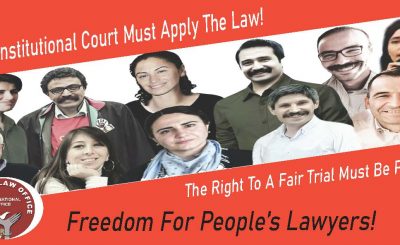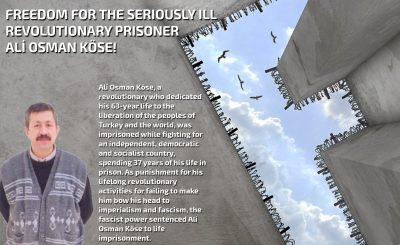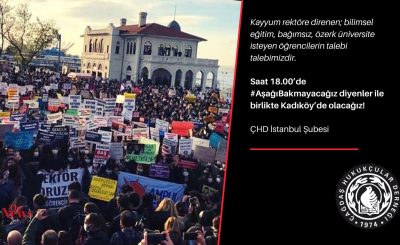In the shantytowns, in the prisons, in the mountains.
Everywhere there is resistance and war! The resistance and war will continue everywhere!
Revolutionary People’s Liberation Front
Date: March 26, 2002 Statement: 248
On March 20, in Ordu Province’s Unye district, near Yesilkent, a gendarmerie special team was involved in a clash with one of our guerrilla units connected to the Black Sea Area Command, and three of our guerrillas were martyred. Three of our vanguard in the People’s Liberation War in the mountains, Gokce Sahin, Sengul Gulsoy and Turan Sahin, gave their lives with honour, courage and pride in the mountains under the banner of independence, democracy and socialism. In every facet of this country, a war front exists.
In every aspect of this country there is tyranny and exploitation.
Since tyranny and exploitation are one and the same throughout our country, every area of it is a theatre of war for us. There are revolutionary forces, not just in the prisons, not just in the shantytowns, not just in the factories, and not just in the mountains; they are everywhere where the people are. As in other areas, up to the present hundreds of our fighters have been murdered by the oligarchy. They were murdered in the cities, in the mountains and in the prisons, and every time they (the enemy) uttered cries of victory and said, from now on they’re finished, there is no point in them going on But after they said that, here and there new resistan ce broke out, a barricade was formed, a bullet was fired, and this showed everyone the reality of war and revolutionary struggle in this country. While this tyranny and oppression goes on the revolutionary struggle does not end. While there are the people in our country’s mountains and cities, the guerrillas will also not cease to exist.
Who were they in these mountains?
Anarchists? Terrorists? You will learn that there are many ways to answer this question on everybody’s lips. There were not in the mountains for adventure or because they were fascinated by guns, as has been said. They fought in the mountains and are the people. They were the poor and oppressed people of this country. They were fighting to organise the masses of the people in the rural areas, to overthrow the power of the oligarchy and found in its place people’s ower, struggling to establish military forces in these mountains. Those who carry guns as they move through the mountains were perhaps until yesterday your next-door neighbour, your work colleague or one of your friends at school. Here are our fighters who were martyred in Ordu:
Turan, first knew the guerrillas at the age of 11. At 13 he wanted to join the guerrillas. The commander Comert Ozen did not accept his request on account of his age. His family sent him to Istanbul to stop him from becoming a guerrilla. But he did not give up his wish. At the age of 17 he became a People’s Liberation Fighter, wearing the red beret with the star. Sengul was the daughter of an impoverished rural family. Poverty did not allow her to continue her education beyond primary school. They emigrated from the countryside to the city. In the city she experienced exploitation and she returned to the village and the mountains, but this time she was politically conscious and a fighter with a weapon in her hand.
Those who do not know the hunger, those who do not know the poverty and the oppression which emerges from every part of our villages and shantytowns cannot understand how a poor village girl or a labourer from a shantytown might want to be a guerrilla.
They cannot understand how our people who are fortunate enough to receive higher education might want to become People’s Liberation Fighters rather than doctors or engineers. Nor can they understand how children like Turan might wish to become guerrillas. And the same people cannot understand why hundreds of prisoners in the cells would lie down and die. This arises from a great passion for freedom. This arises from great love for the people and the homeland.
Those who keep their distance cannot comprehend the love and the anger of those who fight in the mountains and resist in the isolation cells. Emerging from this resistance and war is limitless love and limitless anger. It is the love for the people of every fighter and every revolutionary, it is the anger of everyone against those who exploit and oppress the people. It is this belief and faith in the cause that builds a barricade against every kind of deviation.
The hope of revolution, the claims of the revolution, the march towards revolution continue. The plans of the imperialists and the oligarchy to destroy and bring about surrender are coming to nothing. The Front means resistance, the Front means war; wherever there are supporters of the Front, nobody can destroy the hope of liberation!
The governor of Ordu, Kemal Yazicioglu, said after murdering our three martyrs in Ordu that Wherever I am, there can be no place that terrorism can find shelter All those who come into our area will meet the sam e fate.
Who is Kemal Yazicioglu? In the September 12 period (the 1980 military coup and after in Turkey) he was one of the most notorious torturers at the Ankara DAL house of torture. He is one of Susurluk’s people. He has been responsible for countless acts of torture and has personally ordered many to tortured to death and has been witnessed to have done so in hundreds of cases. But he has never been prosecuted or punished. Instead he was made a GOVERNOR. He was rewarded. He is like all those involved in Susurluk. Kemal Yazicioglu, like Hasan Ozdemir and suchlike, knows nothing other than killing, torture and annihilation. He knows how to kill and afterwards profit from it. He is one of those who server the IMF for money. People like him have passed through all districts by the hundred. They have murdered many, tortured many. But they have not destroyed the people’s struggle against oppression and tyranny. And they will not be able to destroy it. The revolutionary vanguard of the people will not permit it. The IMF’s hand stretches from Washington to the villagers of Ordu, Hakkari, Tekirdag, Manisa, Konya, Urfa and Hatay, strangling them and oppressing them. Agriculture is being killed. Villagers are being killed. We have passed through years of death squads and networks of village guards forcing people to become refugees, putting IMF decrees into effect by force. But it is not possible for the IMF to stretch its hand to the revolutionaries of this country. In the shantytowns of our great cities and in our tiniest villages, we will organise the fight of our people against the imperialists and their collaborators, with recourse to the struggle in all its forms.
OUR MARTYRS:
Gokce SAHIN: Commander of the unit. He joined the Black Sea Unit in July 1998. He was born in Ankara on December 23, 1976. In 1994 he joined the Dev-Genc (Revolutionary Youth) organisation while studying in the chemical engineering department in Hacettepe University. He took on various responsibilities in the struggle and organising youth. He was expelled from university for taking his place in the academic-democratic struggle. In 1995 he was imprisoned. The day he was put in prison the Buca massacre took place. When he was released he resumed his duties. The oligarchy’s repression, violence and his ties to the system on some days stoked up his anger but on other days created hesitation. When it was necessary to go to a different sphere of work, there was on the one hand his family, on the other: there was the struggle, his comrades, the Free Prisoners and the martyrs. And he hesitated.
Either revolution or the system would win. Later on he evaluated this moment of hesitation: I knew the state of human beings who are abandoned. I had seen how disgusting it is in the hole made by the system No, I said, to myself. Definitely I want to be able to look Birtan, Berdan, Sinan and Niyazi in the face I will not abandon this struggle until I have overcome all my weaknesses. I also hate the Gokce who shows closeness to the system. He overcame his hesitation. He took the gun as a People’s Liberation Fighter without hesitation. The system sometimes practises tyranny and sometimes revolutionaries act against themselves, sometimes through family ties or through their own feelings. Those who don’t let the system defeat them are revolutionary fighters and like Gokce they wave the flag of revolution in the fight.
Sengul GULSOY: Joined a guerrilla unit in 1998. She was born on October 10, 1979 in the village of Imranli Baslica (Arikan) in Sivas Province. Gulsoy was a member of an impoverished and landless Kurdish family. They moved to Istanbul in 1987. Sengul was only able to attend primary school. In Istanbul she worked in a number of sweatshops making clothing. In these places, whoever sought their rights or encouraged their colleagues to join a trade union was dismissed. She became acquainted with revolutionaries. In 1995 she joined the Front’s cortege on May Day and supported the Front from that time on. She joined in every kind of action in support of rights and freedom on Istanbul’s Anatolian side, from protests over Susurluk to actions in support of the Death Fast. She was detained several times. She was less than 18 the first time she was detained. But this did not matter to the torturers; they used every type of torture method, from hanging her by the arms to using electricity. But she resisted, became more conscious and was tempered like steel. She took on responsibility for organising in her locality. But for th e sake of a free homeland, she wanted to be a fighter: I want to be a fighter in the city like Sibel, I want to be like Ali Riza Kurt and resist like Sabahat and people like her, she said. I am dying for the movement, she said modestly. Because I do not want my people to be oppressed I want equality and a free country. I want the guilty to be punished. Only the DHKP-C can do this and for this reason it is a movement worth dying for. If I die with this purpose in mind, I will not look back in regret, the fight will go on, weapon in hand, until our power is established; these were some of the things she said in her report.
She was a village girl whose confidence and belief will not be in vain, she was a resister in the shantytowns and a heroine of the mountains.
Turan SAHIN: A People’s Liberation Fighter since October 1997. He was born in the Tokat Province town of Almus on October 10, 1980.
He came from an Ethnic Turkish and Alevi family. Reality for him from a young age was poverty and repression on a daily basis. He knew the guerrillas and loved revolution. After his application to join the guerrillas was not accepted, his family sent him to Istanbul. He worked as a labourer for four years in Istanbul. He saw and experienced everything in Istanbul but his desire to be a guerrilla only increased, because he became more conscious and witnessed exploitation, tyranny and poverty as being exactly the same, whether in the big cities or the smallest villages. Moreover, inequality was more pronounced and obvious. In Istanbul he formed links with the revolutionary movement. In the meantime his body and mind developed and he educated himself. His reason for being a revolutionary and a guerrilla became very developed: this is what he wrote to the Front: We have been exploited for years, there is repression in the villages, people gather food from rubbish dumps, and to find a solution to all that it is necessary to wage a struggle He joined the guerrillas in October 1997. On March 20, 2002 he became immortal as a People’s Liberation Fighter, upholding the duties of revolutionism and patriotism for his people and homeland.
There is no score we have with the system of exploitation and tyranny that will not be settled!
We will carry the banner of liberation our comrades have handed to us until victory!
Devrimci Halk Kurtulus Cephesi



